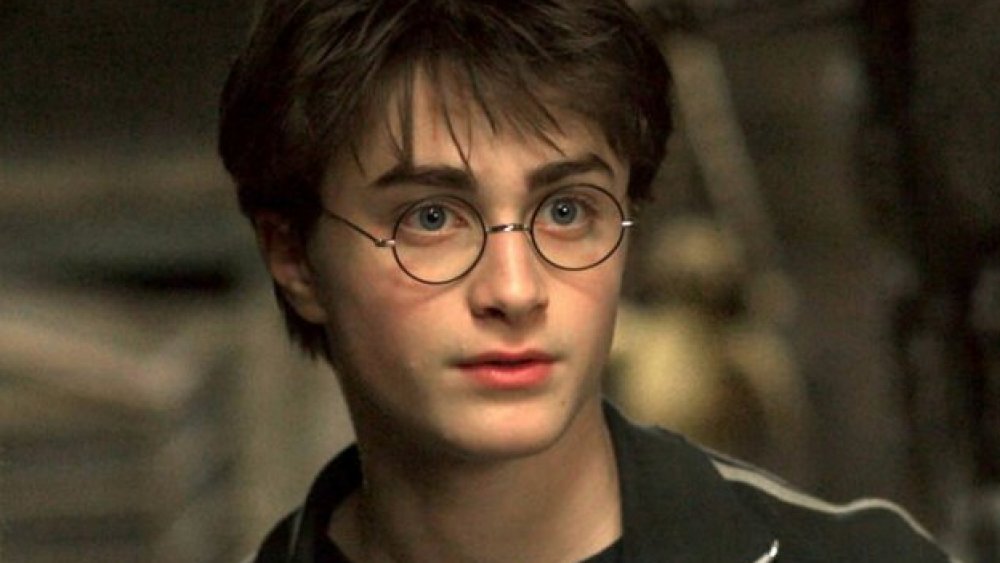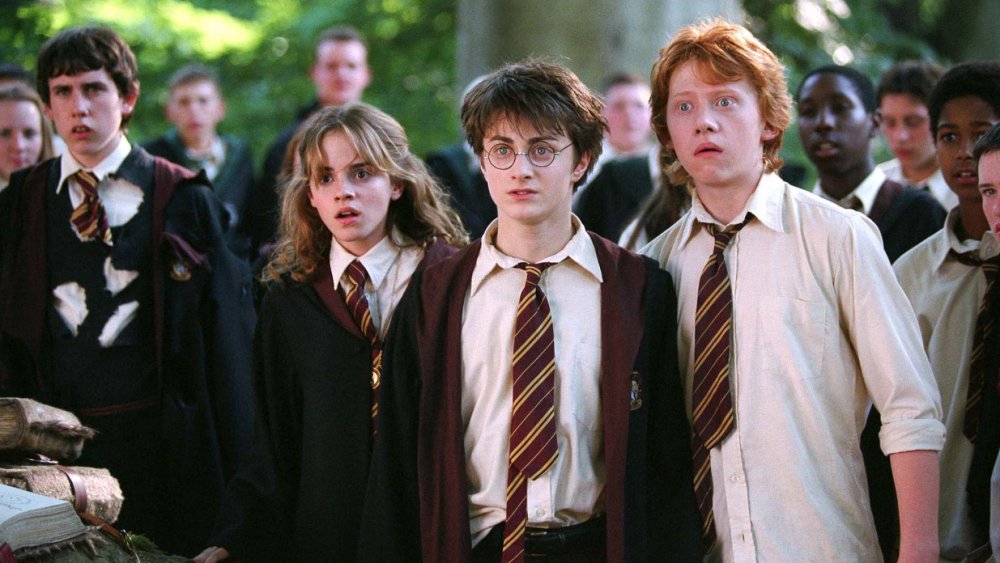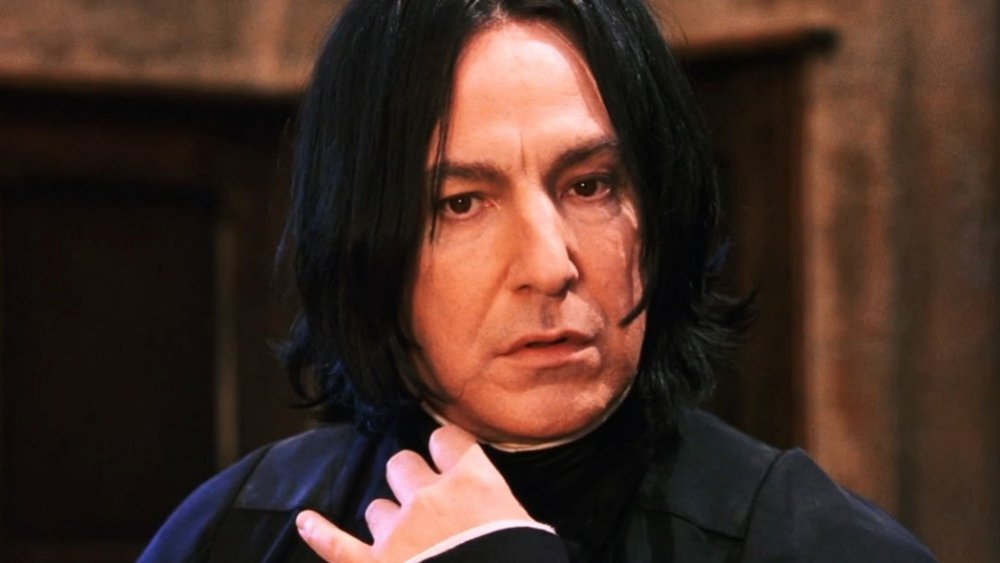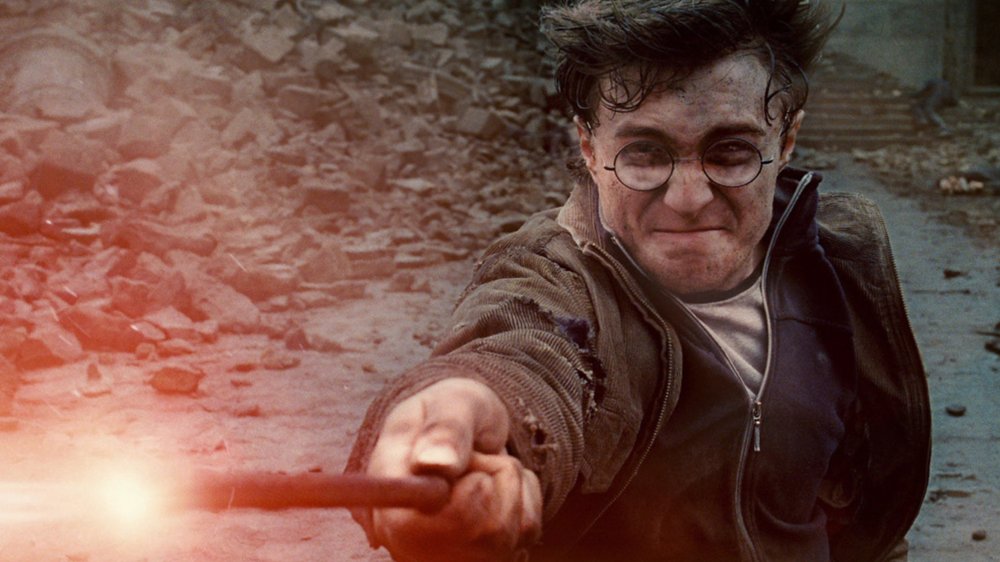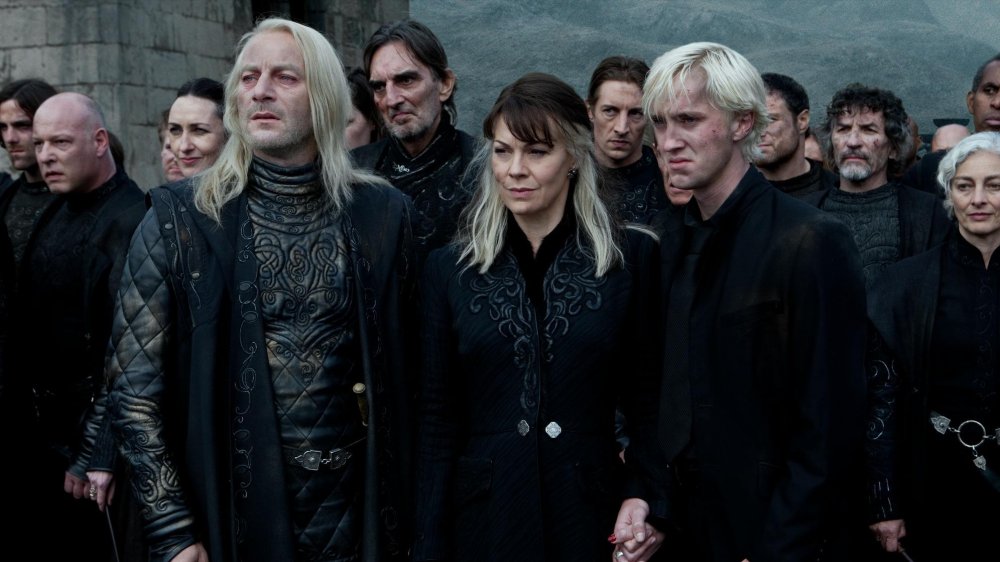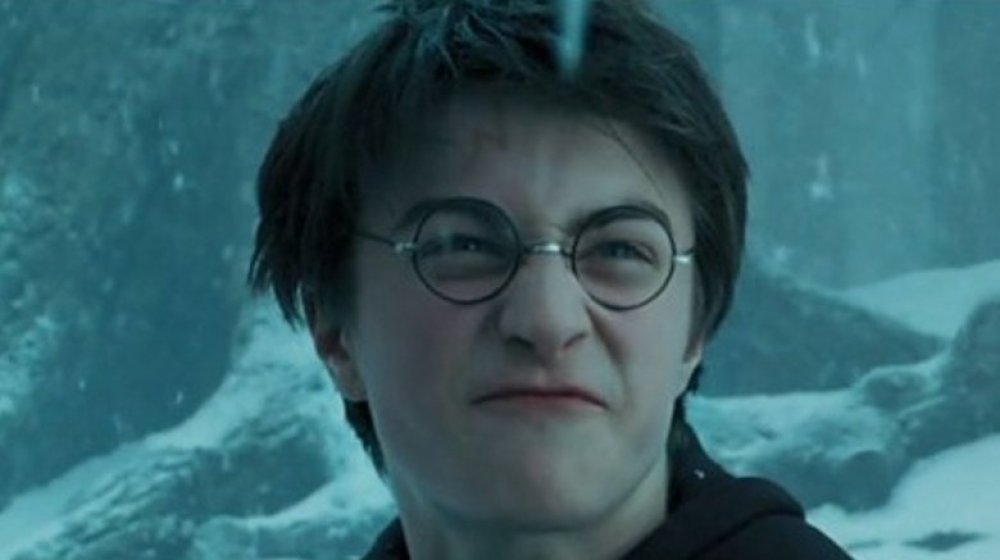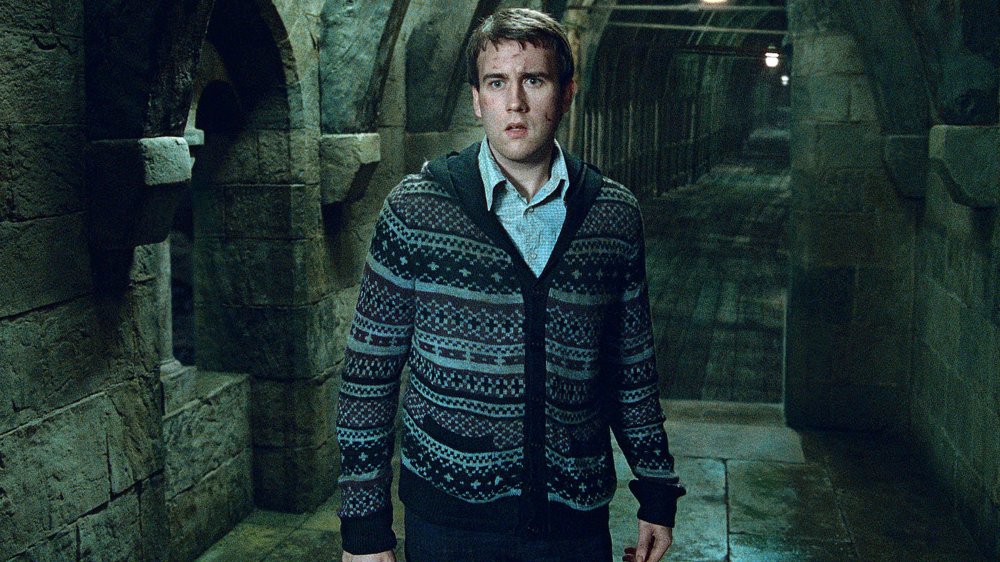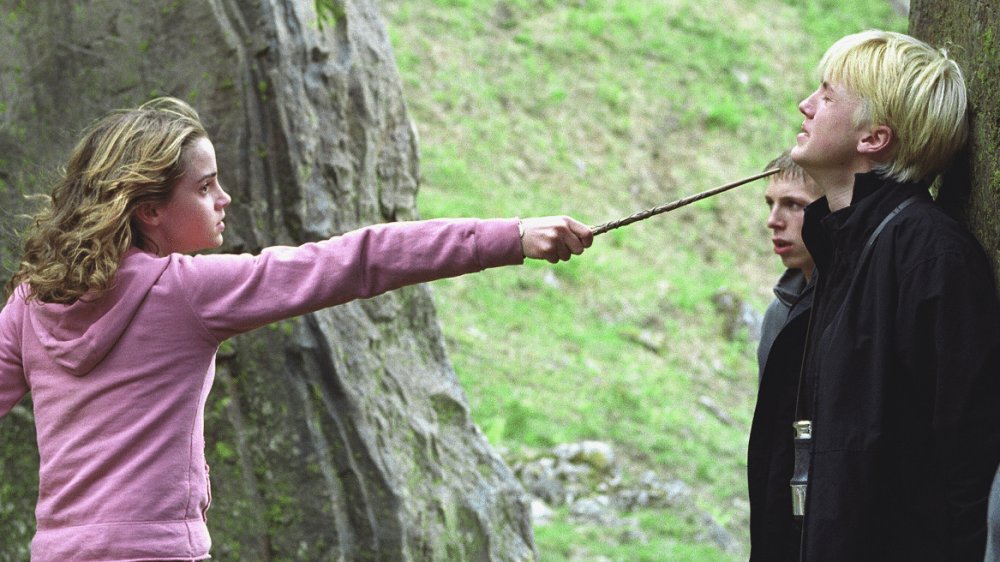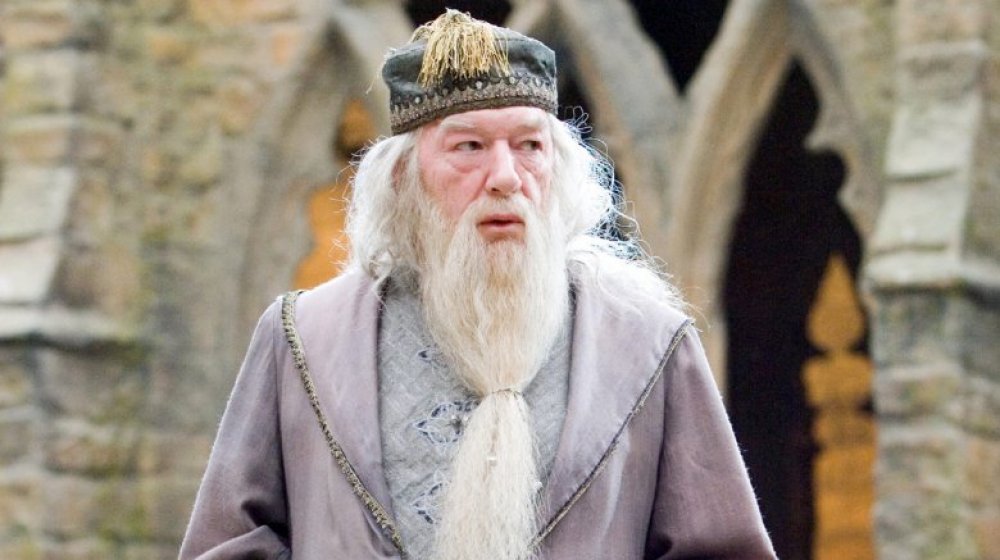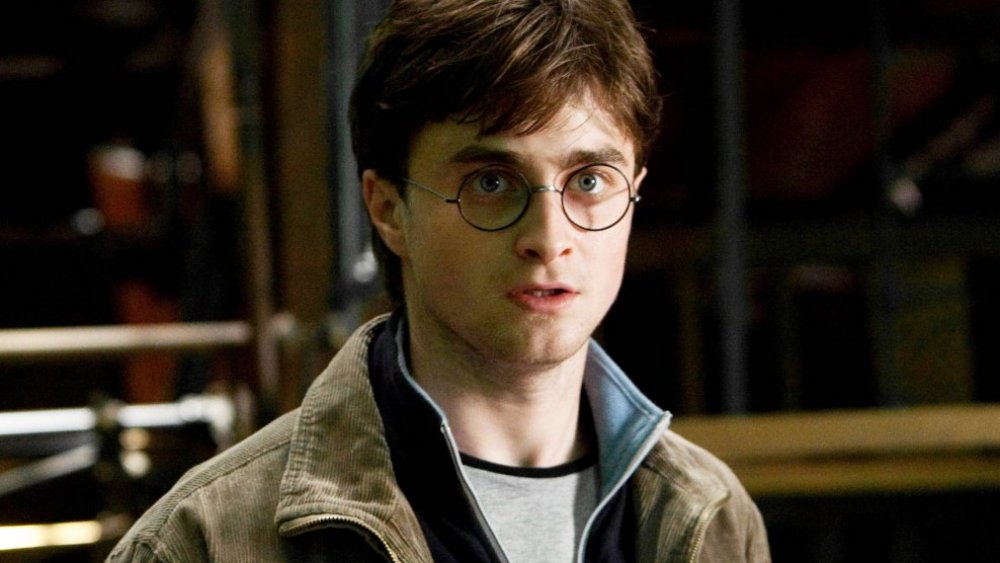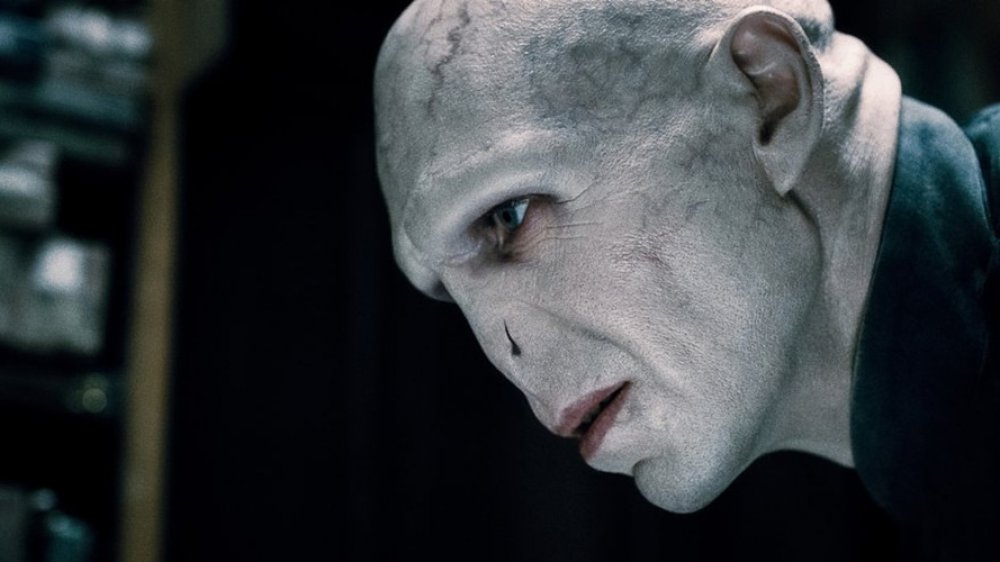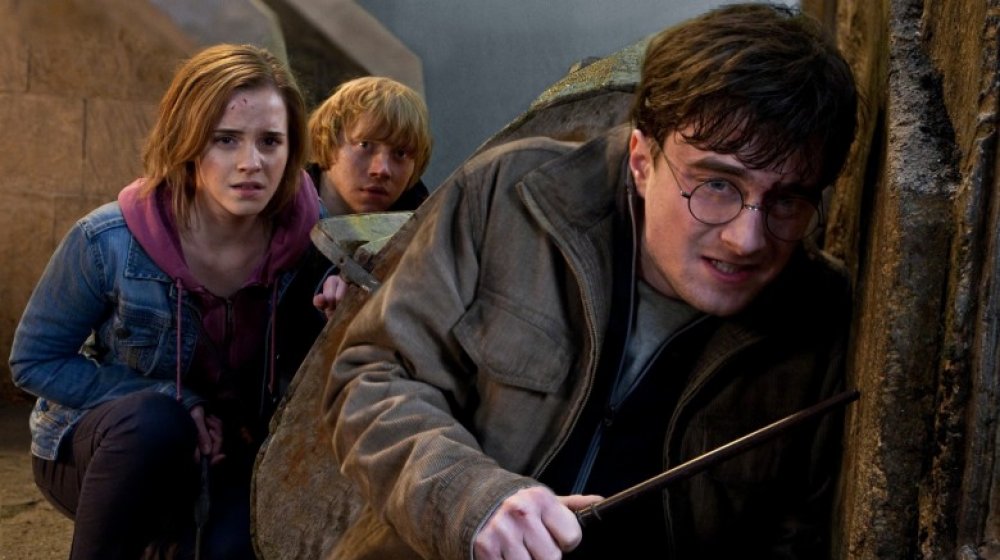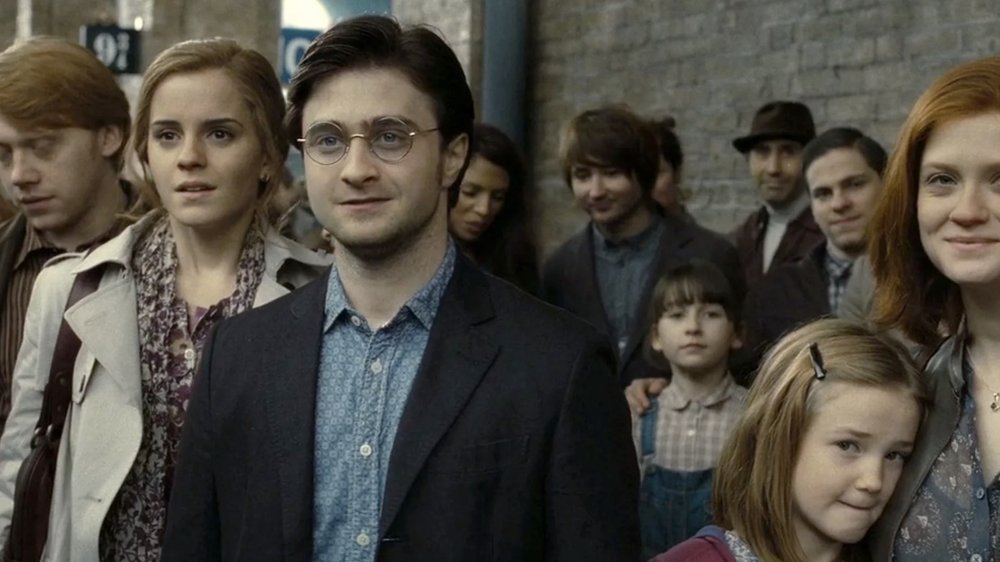Unpopular Opinions About Harry Potter That Raise Good Points
When the first Harry Potter book arrived in 1997, an instant sensation was born, and history was made as this compelling story of a young boy wizard — penned by J.K. Rowling — shot to the top of the bestseller charts. In the years after its release, it spawned an outstandingly successful film franchise, theme parks, a Tony Award-winning Broadway play, and even a set of spinoff films based on one of the series' fictional textbooks. Clearly, Harry Potter isn't going anywhere, and it will remain one of the most beloved series of all time when it comes to both literature and film.
However, anything as popular as Harry Potter is sure to stir up controversy, even among its fans, and there's no shortage of huge arguments throughout the Harry Potter fandom about character motivations, romantic relationships, and more. As with any phenomenon, there are plenty of unpopular opinions about the world of Harry Potter, but with that said, some of those opinions actually bring up some interesting flaws within the wizarding world. Here are some majorly unpopular opinions about Harry Potter that actually raise some good points. This should go without saying, but major spoilers for Harry Potter to follow!
Harry Potter and his friends might not have the healthiest relationships
Throughout the series, Harry (played by Daniel Radcliffe in the films) was constantly flanked by his two best friends, Ron Weasley (Rupert Grint) and Hermione Granger (Emma Watson), who helped him through all sorts of crazy adventures. Naturally, as the books and films continued, fans loved to argue about whether Hermione should end up with Harry or Ron, and eventually, the matter was settled when Ron and Hermione definitively developed feelings for each other at the end of the series.
Even though Rowling herself said that she regrets pairing Hermione and Ron, the couple ended up married in the series' epilogue, putting an end to the whole matter. However, the real question fans should've asked themselves isn't whether or not Ron and Hermione belong together but why every Hogwarts student married their high school sweethearts. Besides Ron and Hermione, Harry also marries his girlfriend from Hogwarts — Ron's younger sister, Ginny (Bonnie Wright) — and presumably, all of these marriages take place when the characters are quite young. Maybe Hermione and Ron really aren't a good fit, but it seems like she should've dated some other people after graduation to find that out for sure.
Severus Snape might be a hero, but he's also a bully
When readers and viewers first meet Severus Snape — played by the late, great Alan Rickman in the films — he immediately comes off as a villain. Even beyond his torturous Potions classes, Snape never misses an opportunity to taunt and antagonize Harry and his fellow Gryffindors. Though this might just seem like Snape favors Slytherin, for which he serves as Head of House, he also particularly hates Harry due to the fact that the boy so closely resembles his father, James, whom Snape despised.
Ultimately, Snape reveals himself as a secret hero as he liess dying in front of Harry. Despite the fact that he apparently returned to his former master, Voldemort (Ralph Fiennes), Snape was always working with Harry's late mentor, Albus Dumbledore (Michael Gambon), to protect Harry and help him on his journey. All of this was as an homage to Lily, Harry's mother, whom Snape always loved. However, even knowing that, there's no ignoring that Snape is completely horrible to a bunch of children who've done nothing to personally wrong him. In fact, he's even meaner to Neville Longbottom (Matthew Lewis) than Harry, likely because he's angry that Voldemort chose to go after the Potters rather than the Longbottoms. Snape has a lot of baggage and does plenty of heroic things, but he could definitely stand to be at least passably polite to innocent children trying to learn from him.
Harry never should've become an Auror
After graduating from Hogwarts, Harry and his friends must enter the wizarding workforce, and he and Ron ultimately become Aurors — Dark wizard catchers — for the Ministry of Magic, the organization that runs the entire wizarding world, creates laws, and protects wizards from being discovered by non-magical Muggles. Though this seems like an appropriate and heroic career choice for "the Boy Who Lived," as he brought down the worst Dark wizard of all time, it's actually a pretty strange move for Harry.
In the series' fifth installment, Order of the Phoenix, Harry returns from his Muggle family's home to discover that the Ministry is trying to discredit his (correct) claim that Voldemort has returned. In fact, they're trying to take Harry down in any way possible, even going so far as to send Dolores Umbridge (Imelda Staunton), a corrupt Ministry official, to infiltrate Hogwarts, and despite the fact that she physically tortures students, including Harry, the Ministry never bothers to offer up an apology. Beyond the Ministry's overt cruelty and complete lack of assistance in the fight against Voldemort, why do Aurors even still exist? After all, the Death Eaters disbanded after Harry defeated their boss, so what's the point of his new job? All in all, it seems like Harry could've chosen a much better career working for an organization that didn't actively try to ruin his life as a teenager.
Slytherin isn't as bad as it seems
When students arrive at Hogwarts, they're sorted into one of four Houses upon arrival. As the school's Sorting Hat says, the brave go to Gryffindor, the hard workers end up in Hufflepuff, sharp-witted students head to Ravenclaw, and cunning children are placed in Slytherin. Immediately, readers and viewers are reminded that Slytherin is the "bad" house. In fact, several people tell Harry that any wizard who eventually turns to the Dark Side spent their time at Hogwarts in Slytherin House.
Slytherin has a reputation for being home to future Dark wizards and snobs who believe that only "pure-blood" wizards have a place in the wizarding world, but ultimately, Slytherin doesn't deserve its bad reputation. In fact, as Rowling later wrote in her online Potter encyclopedia Wizarding World, Merlin himself was a Slytherin. Beyond that, in the onstage continuation of Harry's story, Harry Potter and the Cursed Child, Harry's son, Albus Severus, is sorted into Slytherin, and despite his initial shock and horror, he eventually proves that Slytherins contain multitudes. Slytherin has a bad reputation, but it doesn't really deserve all the hate it gets from Potter fans.
Harry Potter's teenage angst is completely understandable
There's no denying that Harry Potter is one of the most beloved and iconic characters in literary and cinematic history, but one installment of the series tends to divide fans due to Harry's childish and often frustrating behavior. In Order of the Phoenix, the series' fifth book and film, Harry, on the heels of watching Voldemort return and murder one of his classmates, becomes incredibly bitter and angry at everybody in his life, feeling abandoned and isolated from his friends and loved ones.
Fans often complain about Harry's borderline abusive behavior towards Ron, Hermione, and his other companions, but realistically, it makes sense that a 15-year-old boy who's lived through so much incredibly painful trauma would have such a bad attitude. Harry might be the Boy Who Lived, but he's also a teenager shouldering the fate of the entire wizarding world on his shoulders. Plus, he's still grappling with the deaths of his parents and even one of his school friends. Harry might be kind of annoying in Order of the Phoenix, but critical fans definitely need to cut him some significant slack.
Neville Longbottom should've been the Chosen One
Until the fifth book and film, Harry is left completely in the dark as to why Voldemort murdered his parents and tried to kill him when he was just a baby, but eventually, he learns the truth. Voldemort and Harry are the subject of a prophecy made long ago that says the only person who can bring down the Dark Lord will be born as "the seventh month dies" and whose parents will defy Voldemort three times. Perhaps most importantly, "neither can live while the other survives." As James and Lily Potter went up against Voldemort three times and Harry's birthday falls on July 31, Harry seems like the obvious option ... but as Dumbledore points out, Neville Longbottom, Harry's bumbling classmate, could've been the Chosen One.
Also born in late July to parents who defied Voldemort three times, Neville could've ended up as the ultimate hero, except that Voldemort, fulfilling the rest of the prophecy, "marked" Harry as his equal by attacking him. Though Harry's and Neville's fates are sealed once Voldemort tries to kill Harry, Neville would've made a fascinating Chosen One, even more so than Harry. Neville's parents are still alive, but they were tortured into insanity by Death Eaters, and as the story progresses, his thirst for revenge becomes more and more pronounced. Neville's progression from zero to hero, particularly as he gains more confidence and power, had the potential to be way more interesting than Harry's story.
Hermione and Malfoy could've been a power couple
Fans love to argue about whether Hermione should've ended up with Harry or Ron by the end of the series. Putting aside how reductive it is that the series' main female character is often treated by fans as a prize to be won by either Harry or Ron, there's also a way better option for her romantic happy ending. Had they been able to put aside their differences after school, Hermione and Draco Malfoy (Tom Felton) could've made an amazing couple.
As one of the series' main antagonists, Malfoy might not be your first choice for Hermione Granger, a brilliant Muggle-born witch who defies the antiquated beliefs about pure-blood wizarding supremacy that Malfoy and his family believe in and perpetuate. However, if the two were able to move past that, it would not only provide a well-earned redemption arc for Malfoy but potentially lead to a fulfilling relationship between him and Hermione. After all, the two are both ambitious, passionate, driven, and highly intelligent, and they could potentially keep each other on their toes throughout their lives as their relationship smashes bigoted beliefs in the wizarding world. Hermione ultimately ends up with Ron, but it's possible she could've had an amazing romance with Draco Malfoy.
Dumbledore wasn't a good mentor
Throughout the series, Albus Dumbledore serves as a mentor and parental figure to Harry, guiding him through trials and tribulations before his death at the hands of Severus Snape at the climax of the sixth book and film, The Half-Blood Prince. Though Dumbledore is held up as a once-in-a-lifetime teacher, mentor, father figure, and friend, the truth is that Dumbledore isn't exactly helpful to Harry, and his secrecy is actually an enormous hindrance to Harry's journey.
Time and time again, Dumbledore, who seemingly knows every secret about Voldemort and how to bring him down, demurs when Harry directly asks him for answers, forcing Harry to figure out these mysteries on his own at great personal risk. With that in mind, Dumbledore realistically is a pretty terrible mentor, in that he could've just given Harry all of the possible information — including his death, which he actually plans with Snape — before it's too late, causing a ton of death and destruction. It's a better narrative device to have Dumbledore keep a ton of secrets from Harry, but it definitely doesn't make him a very effective mentor.
Harry Potter should've died
As Severus Snape lies dying in the final moments of the battle against Voldemort in Deathly Hallows, he gives Harry a memory containing everything he needs to know, including the fact that Harry is an unwitting Horcrux. See, when Voldemort tried to kill Harry as a baby, he inadvertently put a piece of his soul inside our hero. Now, to fully defeat Voldemort, Harry must sacrifice himself and give his life to bring down the Dark Lord.
However, once he does, he finds himself in a strange place that vaguely resembles a train station, where he's met by Dumbledore, who's been dead for quite some time. After the two discuss what Harry has just done, Dumbledore tells Harry that he can return to defeat Voldemort once and for all, which he does. However, the story would've had much more of an impact if Harry had stayed dead. Sure, killing the title character seems risky, but if Rowling had been willing to go all out, the tale could've shifted to the perspective of his friends and loved ones, who would finally be able to take down Voldemort themselves due to Harry's sacrifice. Harry coming back to finish the job makes sense, but it could've been even more impactful to kill the hero for the good of humanity.
Voldemort should be pitied
As the ultimate bad guy of Harry Potter, Voldemort, born as Tom Marvolo Riddle, seems like nothing but a power-hungry, murderous tyrant who'll stop at nothing to gain full control of the wizarding world and bend it to his evil will. On many levels, that's entirely accurate, but when you think about Voldemort's birth, life, and the circumstances that created the Dark Lord, you might actually feel sort of sorry for him.
To understand Voldemort's whole story, you need to consider the tragic circumstances of his birth. A descendant of the ancient Peverell family, Voldemort was the product of a rotten relationship between Tom Riddle Sr., a handsome and wealthy Muggle, and a pure-blood witch, Merope Gaunt, who poisoned Riddle with love potions to force him to love her. Before the young Tom was born, Merope stopped giving her husband the potion, which caused him to leave, and when Merope died in childbirth, Tom was left alone at an orphanage. For years, he knew almost nothing about his parents or what happened surrounding his birth, and though he goes on one of his earliest murder sprees when he discovers his heritage, Tom Riddle is, ultimately, a sad man. None of his actions are excusable, but it's also pretty easy to forget that Tom was born to parents who weren't actually in love and who were both shunned by their own families.
Two Deathly Hallows movies was too many
When it came time to adapt Harry Potter's final installment, Deathly Hallows, for the big screen, the powers that be — along with David Yates, who directed all of the last few films — decided that the movie should be split into two epic parts, giving Potter fans two chances to experience the franchise's grand finale. Ultimately, the seven-part book series became eight films, Deathly Hallows Part 1 and Part 2, which were released in November 2010 and July 2011, respectively.
While this may have seemed like a way to lengthen the story and make sure every piece of lore from the books was covered, splitting Deathly Hallows in two didn't actually achieve that goal. Several important moments, like the full backstory of Dumbledore's family, were left on the cutting room floor to make room for things like an awkward slow dance between Harry and Hermione and Voldemort's extra-dramatic death, neither of which were in the books. In the end, splitting Deathly Hallows into two movies didn't serve the plot at all, and it was nothing more than a cash grab on Warner Bros.' part.
Harry Potter's epilogue is a perfectly good happy ending
After Harry, Ron, Hermione, and everyone else at Hogwarts finally defeat Voldemort once and for all, the characters are finally at peace, and in both the book and film of Deathly Hallows, we see the aftermath years after the fact. Almost 20 years after the Battle of Hogwarts, Harry, Ginny, Ron, and Hermione head back to King's Cross Station to send their own children off to the magical school, giving audiences a glimpse into the trio's life beyond Hogwarts.
Though fans loved Deathly Hallows as a whole, upon the book's release, the epilogue was widely derided, as readers and audiences felt as if it was unnecessary and that it too neatly tied up a series that never shied away from difficult subjects. However, it's best to remember that, in the end, Harry Potter is a series meant for all ages, and Rowling likely wanted to provide a neat conclusion to the story to satisfy readers young and old, which feels like a pretty impossible task. Ultimately, from a brief glimpse of Draco and his family to the names of our heroes' children, as well as an admission from Harry to his son, Albus Severus, that being sorted into Slytherin would be okay, the epilogue isn't actually that bad, and it serves as a sweet and complete ending to the entire series.
